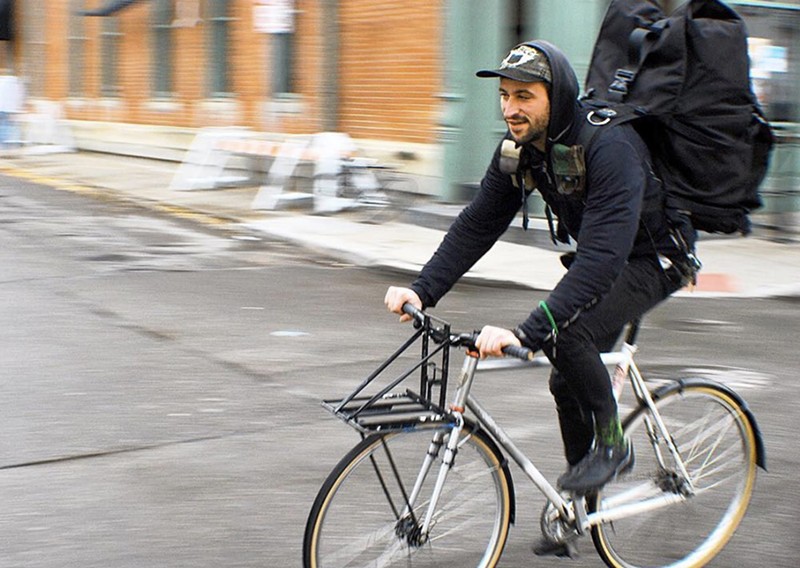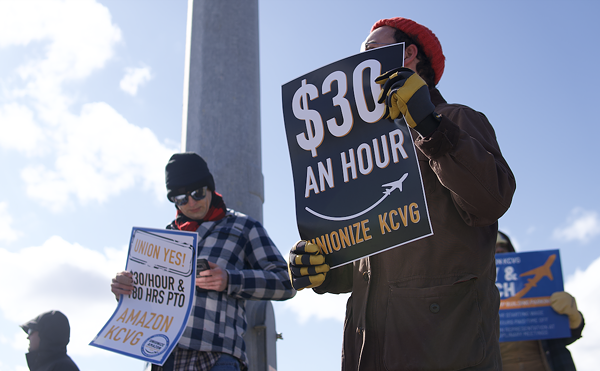I’ve been working as a bike messenger in Cincinnati for 10 years now, entering my 11th winter.
When we shut 53T Courier down at the end of this month, concluding my own career as a messenger, the company will have been in business for eight-and-a-half years.
From the beginning, we made our name with Downtown offices because of our reliability and efficiency. A small group of skilled cyclists who knew the area’s ins and outs, dispatched by people (usually myself), not computer algorithms, all of whom cared deeply about the work we did because, quite simply, we loved doing it. The food delivery apps weren’t even present for the first couple of years, but when they did show up, we were running circles around them. As a result, we managed to retain many, very high-volume, repeat customers, who would order for entire meetings or even entire offices, with whom we did a lot of business. Parcel and legal messenger work was beginning to pick up as well, as this same group of customers started to realize our level of service translated well to those types of jobs.
The pandemic's toll on business
In March of 2020, all of those customers started working from home.
By my estimates, the pandemic shutdown obliterated 70% of our volume nearly overnight. Parcel and legal messenger work almost completely evaporated. Food delivery was partially intact, but nothing could replace Downtown office numbers. While it’s true that the Downtown area and Northern Kentucky have been getting denser from a residential standpoint in recent years, a lot of newcomers to the area are already brand-loyal to the DoorDashers and the UberEats that saw unprecedented growth and investment during the pandemic, and as a small business, we just couldn’t compete with the advertising budget and visibility that those companies have.
Since the beginning, we’d included a non-competition clause in our contract that barred restaurant clients from using other third-party delivery services. But then, we were in the midst of a pandemic and a lot of restaurants were fighting to stay open on carry-out and delivery sales alone. There was absolutely no way I could tell another small business owner, existentially scared for their livelihood, that they were contractually obligated not to boost their sales however they were able. The unfortunate result of that for us was that many of these clients ended up staying on the delivery apps long-term, and that eventually put a huge dent in our own numbers.
I’ve had a few people suggest that we should have developed our own app rather than our method of using our website as an ordering platform. I’d argue that there have already been failed attempts at this from other local food delivery companies in the past, and, in my mind, taking on the cost of developing and maintaining an app would have been rather unwise for a company that exists within food delivery margins. You see proof of this on a macro level, with virtually every food delivery app still not having turned a profit after years and years in business, even in the face of nearly limitless venture capital funding.
For the last couple of years, we’ve been hearing that this or that major Cincinnati employer was bringing people back to the office, but it just hasn’t happened. We held out for as long as we could, waiting for a return to a semblance of our normal Downtown volume, but at this point, it’s clear that this dynamic shift is more dramatic and permanent than we’d all been anticipating. Ultimately, I don’t think there’s much we could have done to prepare for such a completely foundational change.
Constant disrespect from Cincinnati drivers
Burnout was another big part of the decision to close the company for me. Cincinnati is a really, really hard city to be a working cyclist in, purely because of people’s attitudes toward bikes here. You deal with a lot of disrespect and outright malice from motorists, and pedestrians are often just as malevolent or just completely unaware of your presence. We’re incredibly fortunate to have not had a single incident in which a courier was seriously injured, for the entirety of the company.
There have been plenty of scares, however. Several years ago, I was riding west down Sixth Street around noon with a full bag when the passenger side rear door of a sedan swung open without warning in an active lane of traffic, sending my shoulder directly into it with enough force to bend the door at least 6 inches out of hinge. I was largely uninjured, but the driver would not have known, because his immediate concern was for the object he was driving rather than the person whom his passenger could have very nearly killed. One rider got nearly trapped under a delivery truck making an unsignaled turn; another ended up over the hood of a car when its driver, texting and completely unaware of the red light they were running, struck him on Liberty Street. In both cases, mercifully, they escaped with only scrapes.
Day in and day out, you deal with drivers that, in the same breath, will curse you out for a perceived traffic infraction designed to keep yourself safe, and then switch lanes, turn or stop without warning, exceed the speed limit, coast through a red light that is five seconds old, pull a right on red without looking or slowing or, worst of all, be completely unaware of their surroundings, with their eyes buried in a screen. The average driver commits countless traffic infractions that nonetheless, to them, are normalized, and yet many become completely enraged when a cyclist so much as pulls through an intersection ahead of them, simply to put some distance between themselves and the unmitigated chaos behind them. Historically, messengers have a largely unwarranted reputation for being reckless or dangerous. I counter we are more aware of our surroundings than anyone else on the road, and traffic laws were not, in any way, designed to protect us.
After years of being subjected to these conditions on a full-time basis, I found that, no matter how much you genuinely love the job, the hypervigilance required to keep yourself safe on the road, combined with the trauma of dealing with countless close calls and instances of unhinged road rage on a full-time basis can lead to no small amount of anger, bitterness and burnout over time.
The pandemic's toll on work culture
The pandemic aggravated that burnout because it also had the effect of virtually destroying us culturally. Before then, we hung out together at work during slow periods, got our morning coffees together, met up on standby and commiserated about the day’s work after lunch rush. It very much felt like a family. And then, just like that, everywhere we hung out on standby together was gone. Cheapside Cafe was hugely important to us as a place we spent our mornings and lunches, and it closed permanently, pretty much immediately. MOTR Pub, where we gathered in the afternoons and evenings to kill some standby time, shut down for a year and a half to protect their staff.
Moreover, we went from having three to four couriers on at once at peak hours to only two at a time. The job just became so much lonelier. It’s heartbreaking to spend years trying to build a culture of messengers in the city, getting to the point at which you have 10 people working on a weekly basis that would not have had that opportunity in Cincinnati otherwise, and then having that feeling of community at your workplace vanish, practically overnight.
It’s also tough because Cincinnati has almost no prior context, or at least hasn’t since the 1990s, for what a bike messenger is or does. I found myself closing in on a decade working 40 hours a week downtown — and simultaneously trying to build 53T’s name and people’s awareness of working cyclists — and I was still, every day, constantly getting strange looks, people asking me in elevators if I was a BASE jumper or a mountain climber, questions that no reasonable adult should be asking a person in an office building carrying themselves with some clear sense of purpose or urgency. After so long, and in the face of so many other changes, I found myself starting to get very tired of answering the same questions about cargo bikes while I was busy moving wholesale jobs in the morning or referencing the movie Premium Rush simply so people could understand exactly what it is that I did for a living.
The future of the working cyclist is grim
It’s still possible to carve out a full-time living as a bicycle courier, and there are still hundreds if not thousands of working cyclists in any major city. Unfortunately, the overwhelming majority now are working for food delivery apps. Locally-owned companies, including the wave of rider-owned companies that we were part of in the late 2000s and 2010s, are starting to die out.
The implications for the working cyclist are grim, for the very obvious reason that food delivery apps truly do not care about the people they employ. The advent of these companies has dragged the work environment back to the 1980s and 1990s, in that the pay is low and the employer has very little concern or stake in the rider. It’s already tough to be a working cyclist, and the current dehumanizing conditions that app delivery creates make it even tougher, to the point of almost not being worth it.
The pressures of low-pay, high-volume app work have also meant that the majority of couriers these days seem to be on electric bikes. We’ve always disallowed e-bikes among our couriers, except in a couple cases of a courier recovering from an injury, because we wanted to attract strong, skilled riders who can handle being on a bike in the city all day. To be sure, e-bikes are great in that they make cycling so much more accessible to people, and ultimately that is one less car on the road. However, problems tend to arise when you ask someone who depends on the motor to get around and possibly isn’t as skilled a rider to maneuver a 40-50 pound bike capable of reaching 30 miles per hour with relative ease through heavy traffic with a half-dozen jobs getting late in their bag. In a 2017 poll among New York delivery cyclists, almost a third reported being injured seriously enough to miss work. The expense and perceived desirability of e-bikes has also increasingly made couriers the target of violent theft in major cities recently.
All of this is to say, bicycle couriers are and still will be around, and despite their increasing reliance on e-bikes, they are still very much what I would consider working cyclists, but it will look very different than my vision for 53T when we started.
Final reflections
I have a tremendous amount of gratitude for everyone who ever rode for us. As I’ve said, courier work can be very unforgiving, and while I’ve tried my hardest to make it worth everyone’s labor, I know firsthand that there is no amount of money that would feel worth painstakingly pedaling through a foot of snow in single-digit weather to deliver a sandwich. But, I’m proud to say that over the history of the company, we've dropped 97% of our jobs off before due-time, and that is a testament to the people we employed and the passion we all had for this work.
The relationships we’ve built over the years with our clients that have helped us get through each workday were pivotal as well. Lang Thang Group, in particular, and specifically Duy Nguyen and Danny Yant, have been so crucial in 53T’s history, from starting to employ me as their in-house courier to getting us off the ground as a company. I’m also so thankful to our regular customers, some of which we saw on a daily basis at times. Seeing a friendly, familiar face when we got to a drop always made our day so much better.
Despite the struggles of the past three years, and the stresses inherent in messenger work in any city, it’s been a decade that I wouldn’t trade for anything else. I know this city like no one else does, and I’ve seen its every eccentricity, peculiarity and personality up close. I’ve gotten to be my own boss and work alongside a couple dozen or so absolutely stellar people over the years. After all this, it’s time for me to rest, regroup and think about what’s next. I will miss this work so dearly, but, it’s time to move on.
Coming soon: CityBeat Daily newsletter. We’ll send you a handful of interesting Cincinnati stories every morning. Subscribe now to not miss a thing.
Follow us: Google News | NewsBreak | Reddit | Instagram | Facebook | Twitter






